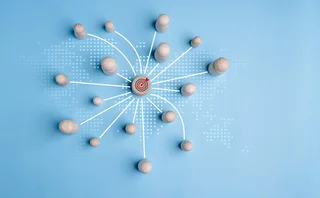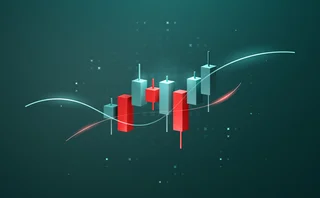Investars Shining Bright
IMD:
What can Investars offer to Goldman Sach's buy-side client base in the current market?Kianpoor: The whole point of our product is to help clients identify the value of research and the value proposition of each research provider by their own criteria. So what if 20 people can't agree on the value of research? They don't have to. Those 20 may work in different ways, invest in different ways, have different baskets of stocks which have different parameters associated with them in terms of research… So what the market needs is a customizable solution… And just because commissions are going away doesn't mean that the value of research is dissipating. In fact, just the opposite: if you look at supply chain management, execution is a huge component of a mutual fund's supply chain. Research is a second component of a mutual fund's supply chain. Just as screws and widgets and tires go into GM's supply chain, a mutual fund manager gets research and execution. And if the cost of execution falls, then the research becomes a more and more valuable component of the alpha-generating process. Execution is becoming a commoditized product, and now the competitive advantage of brokers to their end clients will be the research they provide or third-party tools and platforms that help them identify the value of the research or are themselves valuable.
IMD:
In terms of the deal with Goldman Sachs, what will you be providing them with, and what will they be doing for you?Kianpoor:
They have taken a stake in the company… Goldman's enormous value proposition beyond just the money—which is great for us and allows us to expand—is the trust that they have with their clients and the contacts that they have out there. In our first year, we are looking at getting the top 50 to 100 institutions that need customized research providers, who are at the cutting edge and are willing to adopt new systems and approaches, and are willing to define how this space moves forward. The criteria that these very first people are setting and what they are going to be looking for in terms of customized products will ultimately shape the future of this space.IMD:
Will the work with Goldman Sachs be subject to strict boundaries?Kianpoor:
No, we have no limitations on what we do. We look for any opportunity to expand our reach and our products. We are in knowledge management… there's a broker vote element in the system, there's quantitative ratings, so we're not limited in any way in what we provide to institutional investors…. Our algorithms are things that we have built in-house, and to the extent that we glean feedback from clients, yes, we integrate it into the product. But no-one has ever told us what to do or what not to do.IMD:
As a result of the deal, is Goldman Sachs putting anyone on your management team or on your board?Kianpoor:
We have someone on our advisory board, not the board of directors—Tom Conigliaro, a managing director at Goldman Sachs—and he's been working with us on this, so he's very familiar with the company, what we do, our evolution and our plans for the future.IMD:
What role has the firm played behind the scenes in the lead up to formalizing the agreement?Kianpoor:
We've been working together to figure out what our relationship would be, and how we would fit into Goldman's broader plans in the space. So for us, it's a very simple proposition. For Goldman, it's a question of, out of everything that moves out there, what particular pieces to put together—who is using best practices, who is not, and what do clients want?IMD:
And will there be any change in Investars' strategy going forward as a result?Kianpoor:
In terms of our business strategy, yes. We have to spend a lotless on business resources—sales and marketing—than we would otherwise have to get the same bang for the buck. We can re-invest in programming
and customization and offering our clients better value and cutting-edge technology.
IMD:
What else will it allow you to do specifically in terms of marketing and sales, and what other developments might you be able to undertake as a direct result?Kianpoor:
They can help us in many ways, such as introductions to clients, which are much more efficient when done by Goldman Sachs rather than by people from Investars cold-calling. With all due respect to ourselves, they have a lot more cachet in the space than we do. A lot of our technology work is confidential, but… we plan to do a lot more in the future of looking at the "why" instead of the "what." Instead of just saying "this firm is doing really well," we want to be able to say, "this firm went from number 500 to number one over a period of two months because of its gains in the technology sector—what did they identify over the last few months that everyone else missed?… And why was their model relevant." [We can] share that with the end client… That's a lot easier to do when you don't have to worry about investing in sales and marketing, not only in terms of money but also in terms of time.IMD:
Will Goldman have any input into the development path?Kianpoor:
Goldman Sachs has some great intellectual property working for them, and to the extent that they provide ideas on how to improve our products, we would like to take them into account. But that's the same as we do with our buy-side clients, retail investors, everyone… We would love to get ideas from Goldman, just as we would love to get ideas from Citi and JPMorgan and Merrill and everyone else out there—that's what we thrive on and what we build our systems on.IMD:
And will they be providing input on company strategy as well?Kianpoor:
To the extent that Goldman can offer us any kind of input that helps our company, they obviously know what they are doing… and their strategy and knowledge of the market, yes, absolutely.IMD:
Is the potential client base just broadly buy side, or are there other firms to whom you would be useful?Kianpoor:
Everyone on the buy side would use Insight in different ways… some things would be more important to a hedge fund than a buy-side investor. I think they will buy all the features ultimately, it's just a question of how much they use it. Another market is research providers, because we have intelligence on what their strengths are with our central ability to analyze all of this stuff that sometimes even they don't have at their fingertips.IMD:
Will you be working with the other vendors providing services via Goldman Sachs' Hudson Street Services suite such as Wall Street on Demand and Connotate?Kianpoor:
We would hope to be able to work with all of them. Goldman has presented all these firms with an opportunity, but it is by no means a free ride. They won't continue to support systems that clients don't want. It's going to be decided over the next three years [based on] how the perceptions of the institutional market change, and whether firms will seek tools like ours. All the indications are that they will, so we have to stay ahead of the curve. I'm sure… it's going to be a competitive environment.IMD:
From your point of view, is the arrangement exclusive, or would you consider a similar arrangement with a competitor to Goldman Sachs? Is this a new kind of distribution model for you?Kianpoor:
We have a distribution model and a pipeline right now, and we're very happy with it. We think we'll be able to reach our target group of clients within the first two years, and both Goldman and ourselves are committed to the success of this venture.Am I going to spend more time trying to create another distribution arrangement rather than trying to sell through the one that I currently have? I don't think so. Time to market is critical as institutions are selecting their partners going forward. So while I would like to work with some of our other clients, I think the strategy right now is to hit the end investor, and Goldman Sachs is providing us with the strategy that we need to do that.
CEO Confidential Name: Kei KianpoorBirth Date: October 7, 1967Hometown: Rio de Janeiro, Brazil Education : Vassar College, English LiteratureCurrent Home : Highland Lakes, New JerseyFamily : Wife Doreen; Children Nikki, 8; Lucas, 7; and Katrina, 2Q. What book are you currently reading? A. The Web of Life: A New Scientific Understanding of Living Systems by Fritjof Capra A. The Rolling Stones Q. What was the last movie you watched? A. The Illusionist Q. Which sports team do you root for? A. San Francisco 49ers, New York Yankees, Fluminense (Brazil) in club soccer. Often, I pick an underdog that is playing its heart out. Q. What's your favorite city or place to visit and why? A. We have great friends in Miami, so it is fun to spend time there Q. What newspapers or magazines do you read? A. The New York Times, The Wall Street Journal, USA Today but really almost everything from Inside Market Data to The Economist to National Geographic A. I proof-read articles at the Herald Tribune in Rio at age 13 as part of a school program Q. If you could have dinner with any person, real or fictional, dead or alive, who would it be? A. William Shakespeare. His genius, wit, sense of humor and insight into human nature would make for a very good dinner. It would also be fun to update him on what has happened since, and hear his thoughts. I would try to squeeze in a show after. Q. How much sleep do you get? A. Seven to eight hours, ideally |
Only users who have a paid subscription or are part of a corporate subscription are able to print or copy content.
To access these options, along with all other subscription benefits, please contact info@waterstechnology.com or view our subscription options here: http://subscriptions.waterstechnology.com/subscribe
You are currently unable to print this content. Please contact info@waterstechnology.com to find out more.
You are currently unable to copy this content. Please contact info@waterstechnology.com to find out more.
Copyright Infopro Digital Limited. All rights reserved.
As outlined in our terms and conditions, https://www.infopro-digital.com/terms-and-conditions/subscriptions/ (point 2.4), printing is limited to a single copy.
If you would like to purchase additional rights please email info@waterstechnology.com
Copyright Infopro Digital Limited. All rights reserved.
You may share this content using our article tools. As outlined in our terms and conditions, https://www.infopro-digital.com/terms-and-conditions/subscriptions/ (clause 2.4), an Authorised User may only make one copy of the materials for their own personal use. You must also comply with the restrictions in clause 2.5.
If you would like to purchase additional rights please email info@waterstechnology.com
More on Trading Tech
After acquisitions, Exegy looks to consolidated offering for further gains
With Vela Trading Systems and Enyx now settled under one roof, the vendor’s strategy is to be a provider across the full trade lifecycle and flex its muscles in the world of FPGAs.
Enough with the ‘Bloomberg Killers’ already
Waters Wrap: Anthony interviews LSEG’s Dean Berry about the Workspace platform, and provides his own thoughts on how that platform and the Terminal have been portrayed over the last few months.
BofA deploys equities tech stack for e-FX
The bank is trying to get ahead of the pack with its new algo and e-FX offerings.
Pre- and post-trade TCA—why does it matter?
How CP+ powers TCA to deliver real-time insights and improve trade performance in complex markets.
Driving effective transaction cost analysis
How institutional investors can optimize their execution strategies through TCA, and the key role accurate benchmarks play in driving more effective TCA.
As NYSE moves toward overnight trading, can one ATS keep its lead?
An innovative approach to market data has helped Blue Ocean ATS become a back-end success story. But now it must contend with industry giants angling to take a piece of its pie.
BlackRock, BNY see T+1 success in industry collaboration, old frameworks
Industry testing and lessons from the last settlement change from T+3 to T+2 were some of the components that made the May transition run smoothly.
Banks seemingly build more than buy, but why?
Waters Wrap: A new report states that banks are increasingly enticed by the idea of building systems in-house, versus being locked into a long-term vendor contract. Anthony explores the reason for this shift.







